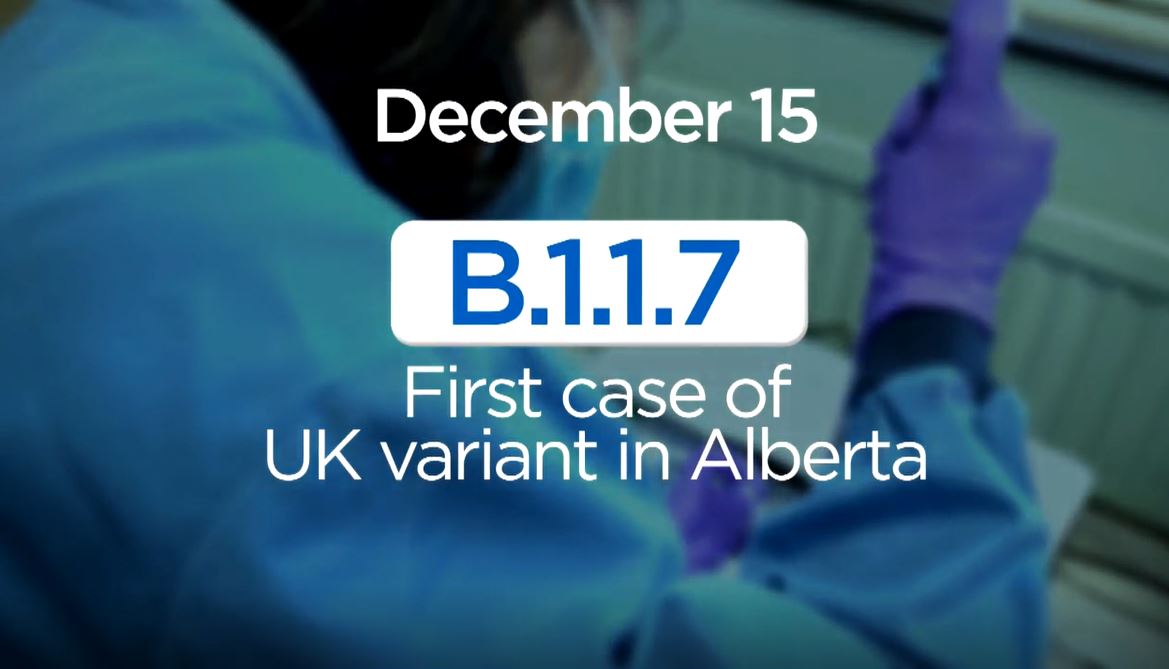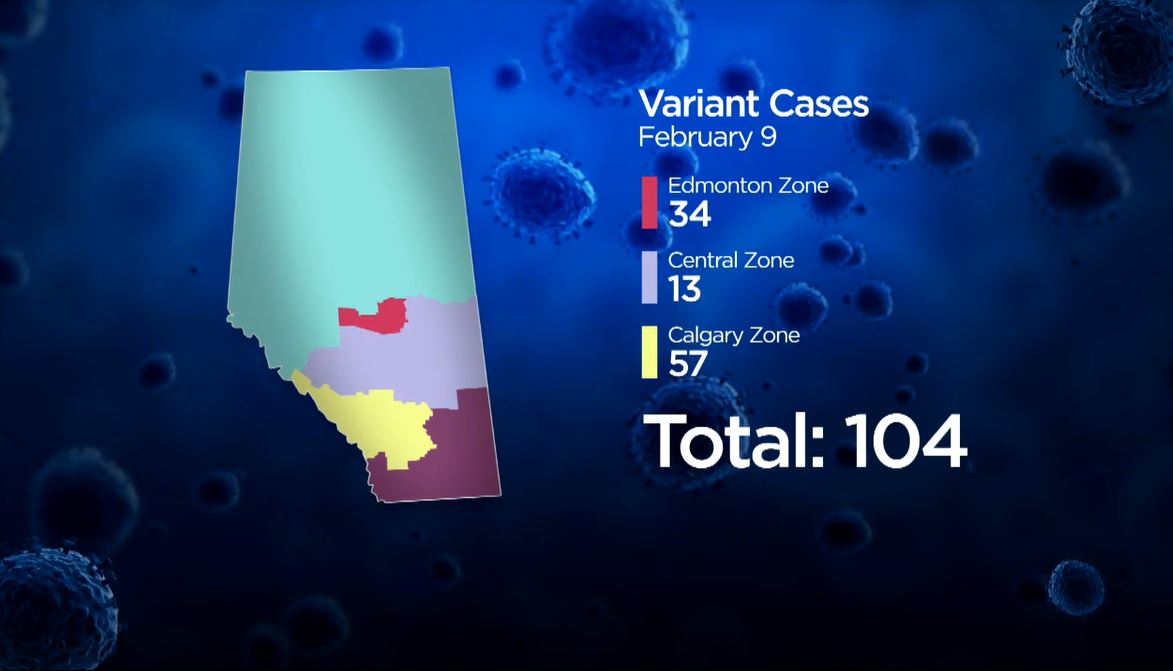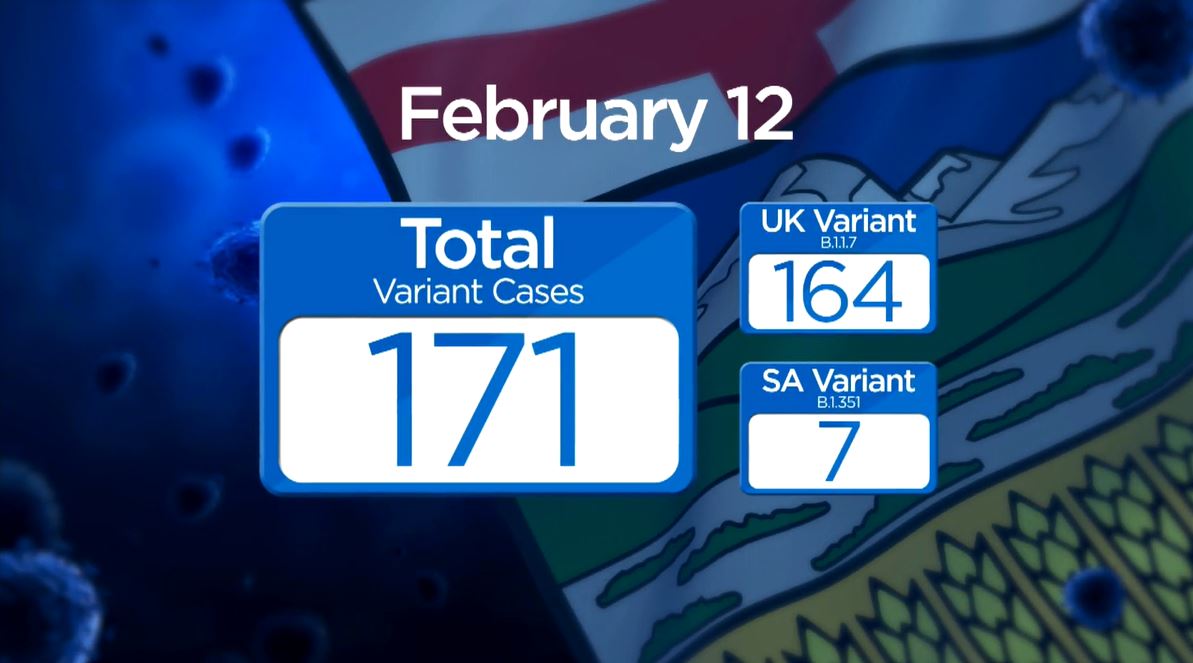It’s one of the biggest wildcards in Alberta’s fight against COVID-19: new, more contagious variants.

Medical experts say Albertans have done a great job driving down case numbers, with COVID-19 cases dropping significantly since they hit their current peak in December, but variant spread could be a game-changer.
The first variant case of COVID-19 was detected in Alberta in mid-December.
Developmental biologist Dr. Malgorzata Gasperowicz says based on the preliminary data she’s seen so far, her independent analysis shows the U.K. variant will become the dominant one in Alberta by March 5.
“On March 24 we will have 1,000 daily new cases and just seven days later, on March 31, we will have 2,000 daily new cases,” Gasperowicz said.
Here is a breakdown of how variant cases rose in the province so far.
December
The first variant case in Alberta was detected on Christmas Eve, but that case actually dated back to a test from Dec. 15, according to Alberta Health.
It was the province’s first case of the B.1.1.7 variant, originally discovered in the U.K.
“This individual did everything they were supposed to do,” Dr. Deena Hinshaw said on Dec. 28, when the news was first made public.
Hinshaw added there was “no evidence that there has been any further spread.”
“At the moment, we have looked at the situation and believe the risk is very low.”
January
On Jan. 8, Alberta’s top doctor announced on Twitter that the province had its first case of the N501Y.V2 variant, originally discovered in South Africa.
It was also the first case detected in Canada.
“I know any new case is concerning, but we are actively monitoring for these variants and working to protect the public’s health,” Hinshaw said.

Get weekly health news
She added that current pandemic measures in place in Alberta are “protective against this variant.”
Along with the N501Y.V2 variant case, there were four cases of the B.1.1.7 variant so far in Alberta — all from travellers returning from out of country.
Alberta recorded its first variant case that was not linked to travel on Jan. 25. By that date, there was a total of 20 B.1.1.7 variant cases and five N501Y.V2 variant cases in the province.
February
At her COVID-19 briefing Feb. 1, Hinshaw said that a variant was likely starting to spread in the community.
That news came on the same day of the first report of a Calgary student attending class while infectious with the U.K. variant. Later, the province would confirm a historic case of a student attending while infectious – dating back to mid-January.
On Feb. 2, community spread was reported inside an Edmonton zone daycare. Four variant cases were detected.
Variant cases had more than doubled — rising from 20 to 57 — in a week.
“I do believe given the doubling time that we’ve been seeing recently in the cases of the new variant and Alberta, that we are approaching a third wave,” University of Calgary epidemiologist Dr. Kirsten Fiest said.
On Feb. 8, when Alberta began Step 1 of the relaunch process, the case count reached 103, with 96 cases of the U.K. variant and seven of the South African variant.
Community case numbers more than tripled between Feb. 4 and Feb. 8, from 15 to 46.
“I think the concern with easing restrictions right now is that we really are opening the door for this variant to become the dominant variant,” Fiest said, adding that from research she’s seen, that could “increase case counts to what we saw in early December, by maybe the end of March.”
For the first time, Albertans got a full picture of where cases were in the province on Feb. 9, when Alberta Health started posting variant cases by zone.
By Feb. 10, the variant had spread inside a school, with two people catching the U.K. variant from exposure in the same class.
There were now a total of 120 variant cases.
Feb. 11 marked the largest single-day increase of variant cases in Alberta to date.
In 24 hours, 36 cases were detected, but Hinshaw clarified that those positive cases weren’t all day-of, and that the tests dated back to the beginning of February.
This pushed the total to 156 total variant cases in the province: 149 B.1.1.7. and seven N501Y.V2.
Of those, 93 were community cases, not linked to travel.
“Many of those are the cases that we have found when we’ve been doing our intensive follow up of cases, double testing close contacts,” Hinshaw said. “The majority of those cases are cases where we know about those transmission mechanisms, where we have identified those.”
As of Feb. 12, there were 171 new variant cases in Alberta.
“I’m super concerned because it will be so difficult to fight,” Gasperowicz said. “The more the viruses circulate through our societies, the more chances they have to mutate, so we are generating this bioreactor for training the virus to be more nasty.”












Comments
Want to discuss? Please read our Commenting Policy first.